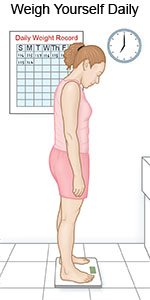Fluid Restriction
Medically reviewed by Drugs.com. Last updated on Aug 4, 2025.
What is fluid restriction?
Fluid restriction means that you need to limit the amount of liquid you have each day. Fluid restriction is needed if your body is holding water. This is called fluid retention. Fluid retention can cause health problems, such as tissue and blood vessel damage, long-term swelling, and stress on the heart. Ask your healthcare provider how much liquid you can have each day.
How do I track my liquid intake?
Keep a record of the amount of every liquid you have each day.
- Liquids can be measured in milliliters (mL), liters (L), ounces (oz), or cups (c). Choose a measurement that is familiar to you. Your healthcare provider or dietitian can show you how to change units of measurement if needed. For example, you may be tracking liquids in mL, but the container lists the amount in ounces. Your provider or dietitian can show you how to find how many mL are in the container. You may be able to use a chart or computer program to make this easier.
- Remember to record the amount of liquid you use to swallow your medicines.
- Soup needs to be separated into liquids and solids before you eat it. Write down the amount of liquid before you eat.
How much liquid is in common foods and drinks?
Liquid from both foods and drinks should be counted toward your daily liquid limit:
- 12 ounces (1 can) of soda (332 mL)
- 1 cup of juice (215 mL) or 2% milk (217 mL)
- 6 ounces of coffee (175 mL) or 6 ounces of tea (168 mL)
- 1 cup of gelatin (200 mL)
- 1 single popsicle (45 mL)
- 1 cup of ice cream (100 mL) or sherbet (127 mL)
- 1 cup of yogurt (182 mL) or cottage cheese (185 mL)
- 1 cup of raw peaches, canned in juice (218 mL)
- 1 cup of grapes (120 mL) or berries (130 mL)
- 1 cup of watermelon (140 mL)
- 1 cup of cooked broccoli (170 mL) or creamed corn (200 mL)
How should I monitor my weight?
Weigh yourself at the same time every day, with the same scale. Record your weight so you can compare it to your other daily weights. You may be retaining fluid if your weight goes up by more than 2 pounds in 24 hours. If you have a sudden weight loss, you may be dehydrated.
 |
Related medications
Treatment options
The following list of medications are related to or used in the treatment of this condition.
What else should I know about fluid balance?
- Large amounts of sodium from foods can cause fluid retention. Sodium is found in table salt, salted snacks, bacon, cheddar cheese, soy sauce, lunch meat, and canned vegetables. Ask your healthcare provider how much sodium you can have each day.
- Diuretics are medicines that can help your body get rid of extra fluid. If you take diuretics, follow your healthcare provider's directions. You may become dehydrated if you take too much of this medicine.
What can I do if I feel thirsty?
- Sip your liquid. Small sips throughout the day may help relieve or prevent thirst.
- Gum or hard candy can help your mouth feel less dry.
- Rinse your mouth. You can use mouthwash or water. Do not swallow after you rinse.
- Limit salt. Salt may make your thirst worse. Do not eat foods that are high in salt, such as crackers. Do not add salt to your food.
- Frozen liquids may help with thirst, and can help you get liquids more slowly. You will still need to count the liquid in your daily amount. Before you have these for the first time, figure out the amount of liquid they contain. For example, you can let a few ice chips or a popsicle melt and measure the amount of liquid. Record the amount so you will know it the next time you have the ice chips or popsicle.
Call your local emergency number (911 in the US) if:
- You have shortness of breath.
- You have chest pain.
When should I call my doctor?
- You have a severe headache that does not get better with medicine.
- You gain 2 pounds in 1 day.
- Your skin is tight and shiny.
- You are urinating very little, even though you are regularly drinking liquids.
- You have signs of dehydration, such as a headache, dark yellow urine, dry eyes or mouth, or a fast heartbeat.
- You have questions or concerns about your condition or care.
Care Agreement
You have the right to help plan your care. Discuss treatment options with your healthcare provider to decide what care you want to receive. You always have the right to refuse treatment. The above information is an educational aid only. It is not intended as medical advice for individual conditions or treatments. Talk to your doctor, nurse or pharmacist before following any medical regimen to see if it is safe and effective for you.© Copyright Merative 2025 Information is for End User's use only and may not be sold, redistributed or otherwise used for commercial purposes.
Learn more about Fluid Restriction
Treatment options
Further information
Always consult your healthcare provider to ensure the information displayed on this page applies to your personal circumstances.
